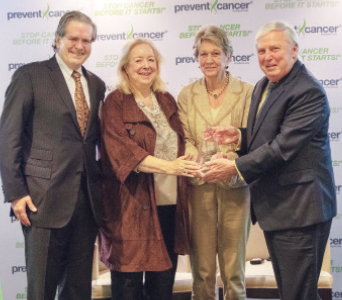The Prevent Cancer Foundation recently honored Andrew C. von Eschenbach, MD, with the James L. Mulshine, MD, Leadership Award for his work leading the National Lung Screening Trial (NLST), the first large-scale clinical trial for low-dose computed tomography (CT) lung cancer screening. The award was presented on October 10, 2019, at the 16th annual Quantitative Imaging Workshop: Lung Cancer, COPD, and Cardiovascular Disease.

Andrew C. von Eschenbach, MD, receives the James L. Mulshine, MD, Leadership Award from the Prevent Cancer Foundation. Left to right: Dr. Mulshine; Claudia Henschke, PhD, MD; Carolyn R. Aldigé; and Dr. von Eschenbach.
In 1999, when the first success of spiral CT in detecting early lung cancer was reported, much of the world was skeptical—but the response at the Prevent Cancer Foundation was markedly different. In conjunction with the Roy Castle Foundation and Cheri Blair, wife of the Prime Minister of the United Kingdom, the Foundation held the U.K.-U.S. Millennium Lung Cancer Workshop to explore how a randomized CT trial could determine whether lung cancer screening might really reduce deaths from lung cancer.
At that meeting, Richard Klausner, MD, then-director of the National Cancer Institute (NCI), expressed strong interest in having the NCI conduct this study. His successor, Dr. von Eschenbach, stepped in to fulfill the difficult task of finalizing the study design and ensuring sufficient resources to execute this massive trial. To this day, the NLST is the largest and most expensive single cancer site screening trial conducted in the United States.
NLST Findings
Under Dr. von Eschenbach’s leadership, the National Lung Screening Trial proved that low-dose CT scans are superior to chest x-rays in screening current or former smokers. In fact, screening with low-dose CT was shown to reduce lung cancer deaths by at least 20%.
As a result of this trial, the U.S. Preventive Services Task Force recommended lung cancer screenings, and the Centers for Medicare & Medicaid Services (CMS) issued a decision to reimburse beneficiaries who meet the age and tobacco-exposure criteria for this screening service. The NLST inspired other trials in Europe and elsewhere, including the NELSON trial, which validated these findings and suggested an even greater mortality reduction benefit.
Before joining the NCI, Dr. von Eschenbach worked for more than 3 decades as a physician, surgeon, oncologist, and executive, including serving as Chairman of the Department of Urologic Oncology, Executive Vice President, and Chief Academic Officer at The University of Texas MD Anderson Cancer Center in Houston. He also served as President-Elect of the American Cancer Society. After his time at the NCI, he was Commissioner of the U.S. Food and Drug Administration. ■

